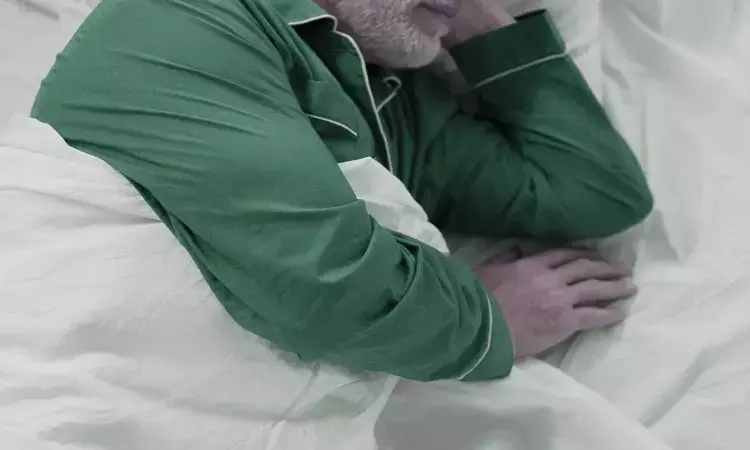- Home
- Medical news & Guidelines
- Anesthesiology
- Cardiology and CTVS
- Critical Care
- Dentistry
- Dermatology
- Diabetes and Endocrinology
- ENT
- Gastroenterology
- Medicine
- Nephrology
- Neurology
- Obstretics-Gynaecology
- Oncology
- Ophthalmology
- Orthopaedics
- Pediatrics-Neonatology
- Psychiatry
- Pulmonology
- Radiology
- Surgery
- Urology
- Laboratory Medicine
- Diet
- Nursing
- Paramedical
- Physiotherapy
- Health news
- Fact Check
- Bone Health Fact Check
- Brain Health Fact Check
- Cancer Related Fact Check
- Child Care Fact Check
- Dental and oral health fact check
- Diabetes and metabolic health fact check
- Diet and Nutrition Fact Check
- Eye and ENT Care Fact Check
- Fitness fact check
- Gut health fact check
- Heart health fact check
- Kidney health fact check
- Medical education fact check
- Men's health fact check
- Respiratory fact check
- Skin and hair care fact check
- Vaccine and Immunization fact check
- Women's health fact check
- AYUSH
- State News
- Andaman and Nicobar Islands
- Andhra Pradesh
- Arunachal Pradesh
- Assam
- Bihar
- Chandigarh
- Chattisgarh
- Dadra and Nagar Haveli
- Daman and Diu
- Delhi
- Goa
- Gujarat
- Haryana
- Himachal Pradesh
- Jammu & Kashmir
- Jharkhand
- Karnataka
- Kerala
- Ladakh
- Lakshadweep
- Madhya Pradesh
- Maharashtra
- Manipur
- Meghalaya
- Mizoram
- Nagaland
- Odisha
- Puducherry
- Punjab
- Rajasthan
- Sikkim
- Tamil Nadu
- Telangana
- Tripura
- Uttar Pradesh
- Uttrakhand
- West Bengal
- Medical Education
- Industry
Sleep disorders tied to increased risk of type 2 diabetes: Study

USA: People with type 2 diabetes have a high prevalence of type 2 diabetes (T2D) that negatively affects health outcomes. The researchers in a recent study stress the need for efforts to diagnose and treat sleep disorders in T2D patients in order to improve health and therefore quality of life since treatment of sleep disorders could prevent diabetes progression. The study findings appear in the journal Diabetologia.
Diabetes is one of the leading global health problems that lead to many other diseases like blindness, cardiovascular disease, renal diseases. There are an estimated 72.96 million cases of diabetes in the adult population of India. Sleep disorders are linked to the development of type 2 diabetes and increase the risk of developing diabetic complications. A new review by Samantha B. J. Schipper and the team pointed out the risks of developing diabetic complications due to sleep disorders.
The objective of the study was to evaluate the literature on the prevalence of sleep disorders in type 2 diabetes and its association with negative health outcomes has led to a recommendation that more effort should be made to diagnose and treat sleep disorders.
The reviewers discussed the study by researchers in the Netherlands and America that identified sleep problems are linked to the development of type 2 diabetes and increased the risk of developing diabetes complications, the treatment of sleep disorders could have played an important role in the prevention of the progression of the condition. The team conducted a literature survey in PubMed from its inception until January 2021, using a relevant survey. They also found that insomnia (39% [95% CI 34, 44]), obstructive sleep apnoea (55–86%), and restless legs syndrome (8–45%) were more prevalent in people with type 2 diabetes, compared with the general population. In addition, a number of other studies reviewed showed that sleep disorders negatively affect health outcomes in at least one area of diabetes, especially glycaemic control, with insomnia associated with increased HbA1c levels.
The research also highlighted that further investigation into this subject area is required, as there have been few randomized controlled trials that examine the effect of treating sleep disorders in people with type 2 diabetes.
The reviewers concluded that "sleep disorders are highly prevalent in people with type 2 diabetes, and negatively affecting health outcomes. Since treatment of the sleep disorder could prevent diabetes progression, efforts should be made to diagnose and treat sleep disorders in type 2 diabetes in order to ultimately improve health and therefore the quality of life."
For further information:
Samantha B. J. Schipper, Maaike M. Van Veen, Petra J. M. Elders, Annemieke van Straten, Ysbrand D. Van Der Werf, Kristen L. Knutson & Femke Rutters "Sleep disorders in people with type 2 diabetes and associated health outcomes: a review of the literature" Diabetologia (2021).
Dr Kartikeya Kohli is an Internal Medicine Consultant at Sitaram Bhartia Hospital in Delhi with super speciality training in Nephrology. He has worked with various eminent hospitals like Indraprastha Apollo Hospital, Sir Gangaram Hospital. He holds an MBBS from Kasturba Medical College Manipal, DNB Internal Medicine, Post Graduate Diploma in Clinical Research and Business Development, Fellow DNB Nephrology, MRCP and ECFMG Certification. He has been closely associated with India Medical Association South Delhi Branch and Delhi Medical Association and has been organising continuing medical education programs on their behalf from time to time. Further he has been contributing medical articles for their newsletters as well. He is also associated with electronic media and TV for conduction and presentation of health programs. He has been associated with Medical Dialogues for last 3 years and contributing articles on regular basis.
Dr Kamal Kant Kohli-MBBS, DTCD- a chest specialist with more than 30 years of practice and a flair for writing clinical articles, Dr Kamal Kant Kohli joined Medical Dialogues as a Chief Editor of Medical News. Besides writing articles, as an editor, he proofreads and verifies all the medical content published on Medical Dialogues including those coming from journals, studies,medical conferences,guidelines etc. Email: drkohli@medicaldialogues.in. Contact no. 011-43720751


